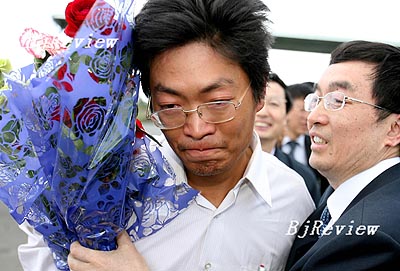
When they finally boarded homeward bound planes leased by the Chinese Government on May 29 of last year, the more than 200 Chinese expatriates in conflict-ridden Timor-Leste must have breathed a collective sigh of relief and gratitude. But they may have known little about the diplomatic flurry that ensured their safe evacuation.
On that very day, China's Ministry of Foreign Affairs set up the first ever Consular Protection Division under its Department of Consular Affairs to take care of Chinese citizens and companies abroad.
Last month, the ministry changed the division's name to the Consular Protection Center and issued a revised version of its brochure on consular protection and assistance. At the center's inauguration ceremony, Foreign Minister Yang Jiechi said the Foreign Ministry and diplomatic missions in foreign countries should do a good job in this regard in light of the principles of "putting people first" and "building a harmonious society," he added.
Now, the Consular Protection Center is busy trying to integrate its resources and improve its coordination with respect to the early warning and handling of incidents, issuing information and incorporating related legislation.
"Consular protection" refers to the protection offered by Chinese embassies and consulates to its citizens in foreign countries, according to principles of international law and international treaties, bilateral treaties and local laws when their legitimate rights and interests are harmed, said Chen Xiongfeng, Deputy Director of the Consular Protection Center. Specifically, Chinese embassies and consulates can provide lists of lawyers, translators and doctors to Chinese citizens abroad when they need them, he said.
Residents of the Chinese mainland, as well as those from Hong Kong, Macao and Taiwan, and the Chinese who live abroad are entitled to the consular protection of the Chinese Government.
Chinese diplomatic missions handled some 31,000 consular protection cases last year, Chen said. The cases mainly fell into four categories: accidents, lawsuits against Chinese citizens, safety problems in turbulent countries and deliberate infringements on the lawful rights of Chinese citizens.
The newly revised brochure on consular protection comprises special warnings for going abroad, services that consular officials can and cannot offer and answers to frequently asked questions.
Compared with the two previous versions issued in 2000 and 2003, the new brochure is more practical and detailed and has additional contact information for government agencies, especially Chinese embassies and consulates. The first 50,000 copies were distributed free of charge at airports in Beijing, Shanghai and Guangzhou.
Stronger protection
Consular protection is taking on greater magnitude as increasingly more Chinese travel to foreign countries. Statistics from the Foreign Ministry show that the Chinese made only 280,000 trips abroad from 1949, when the People's Republic was founded, to 1979. However, in 2006 alone, more than 34.5 million trips were made, a more than 120-fold increase from the previous figure.
By the end of 2006, the number of Chinese workers in foreign countries had reached 675,000, while Chinese-invested enterprises abroad had numbered more than 10,000.
The World Tourism Organization forecasted that the number of outbound Chinese travelers would hit 100 million by 2020.
In this context, there is a real need to expand the previous Consular Protection Division, which had only seven staffers, into the current Consular Protection Center with 15 staffers, Chen said. The division's responsibility in coordination also has strengthened, he added.
"China's consular protection has undergone gradual changes," said Jin Canrong, Deputy Dean of the Institute of International Studies at the Renmin University of China. "The establishment of the Consular Protection Center is the culmination of China's persistent efforts in this regard."
China has made remarkable progress in consular protection over the past decade, something that is commensurate with its growing economic strength, rising international influence and deepening integration into the world, Jin said.
Decades ago, few Chinese citizens made private trips to foreign countries. At that time, consular services were conducted mainly for the government and diplomacy, Jin said. He added that since China adopted its reform and opening-up policy in the late 1970s, more and more Chinese companies and citizens have exposed themselves to potential risks by branching out to do business, making investments, working, traveling and studying abroad.
| 